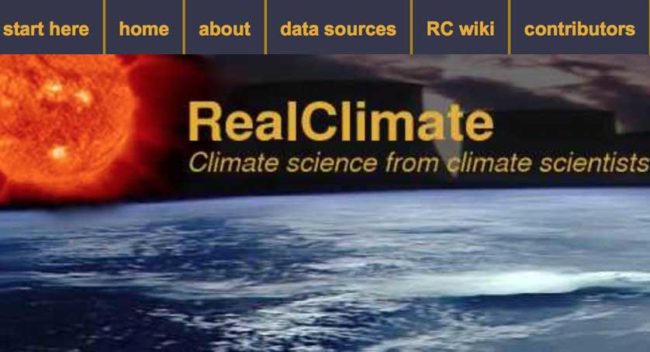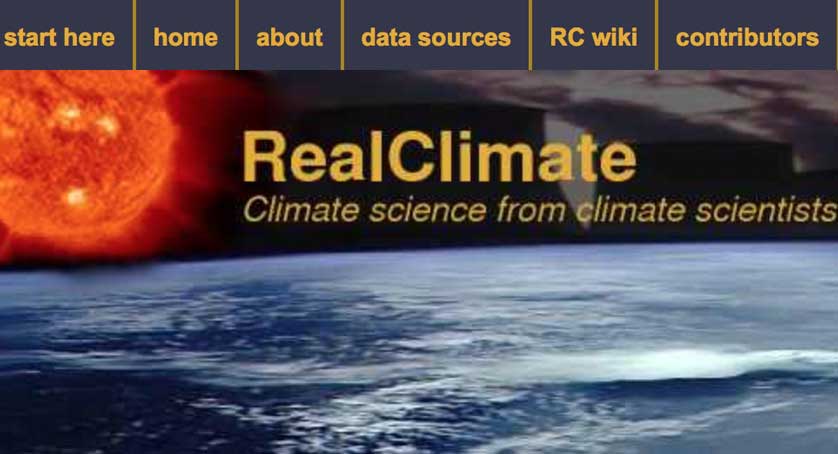 The website RealClimate has a great “StartHere” option where you can learn all about climate science. Is that really a good place to start, or is it simply one lone subject matter expert listing things from his unique viewpoint?
The website RealClimate has a great “StartHere” option where you can learn all about climate science. Is that really a good place to start, or is it simply one lone subject matter expert listing things from his unique viewpoint?
Actually, it really is a great place to start. The website consists of commentary on climate science by active climate scientists. To be a tad more precise, specifically these guys. If you are familiar with the movers and shakers in the climate science arena then you will most probably recognise these names …
- Gavin Schmidt is a climate modeller at the NASA Goddard Institute for Space Studies and Earth Institute at Columbia University in New York
- Dr. Michael E. Mann is Distinguished Professor of Atmospheric Science at Penn State University, with joint appointments in the Department of Geosciences and the Earth and Environmental Systems Institute (EESI). He is also director of the Penn State Earth System Science Center (ESSC).
Where should I start if I know nothing?
I’m not asking that question in the context of a career change, nor am I proposing that you should abandon everything and embark upon an university education, but rather, “Where should I go to learn more about climate science?” in the context of simply being interested.
Their one-stop link for resources on where you can go to get up to speed on the topic of climate change is both rich and deep and also includes various levels …
For complete beginners:
NCAR: Weather and climate basics
Center for Climate and Energy Solutions: Global Warming basics
Wikipedia: Global Warming
NASA: Global Warming update
National Academy of Science: America’s Climate Choices (2011)
Encyclopedia of Earth: Climate Change Collection
Global Warming FAQ (Tom Rees)
Global Warming: Man or Myth? (Scott Mandia, SUNY Suffolk)
Oxford Begbrooke: Climate Basics
There is a booklet on Climate Literacy from multiple agencies (NOAA, NSF, AAAS) available here(pdf).
The UK Govt. has a good site on The Science of Climate Change (added Sep 2010).
The portal for climate and climate change of the ZAMG (Zentralaanstalt für Meteorologie und Geodynamik, Vienna, Austria). (In German) (added Jan 2011).
Those with some knowledge:
The IPCC AR4 Frequently Asked Questions (here are an excellent start. These cover:
- What Factors Determine Earth’s Climate?
- What is the Relationship between Climate Change and Weather?
- What is the Greenhouse Effect?
- How do Human Activities Contribute to Climate Change and How do They Compare with Natural Influences?
- How are Temperatures on Earth Changing?
- How is Precipitation Changing?
- Has there been a Change in Extreme Events like Heat Waves, Droughts, Floods and Hurricanes?
- Is the Amount of Snow and Ice on the Earth Decreasing?
- Is Sea Level Rising?
- What Caused the Ice Ages and Other Important Climate Changes Before the Industrial Era?
- Is the Current Climate Change Unusual Compared to Earlier Changes in Earth’s History?
- Are the Increases in Atmospheric Carbon Dioxide and Other Greenhouse Gases During the Industrial Era Caused by Human Activities?
- How Reliable Are the Models Used to Make Projections of Future Climate Change?
- Can Individual Extreme Events be Explained by Greenhouse Warming?
- Can the Warming of the 20th Century be Explained by Natural Variability?
- Are Extreme Events, Like Heat Waves, Droughts or Floods, Expected to Change as the Earth’s Climate Changes?
- How Likely are Major or Abrupt Climate Changes, such as Loss of Ice Sheets or Changes in Global Ocean Circulation?
- If Emissions of Greenhouse Gases are Reduced, How Quickly do Their Concentrations in the Atmosphere Decrease?
- Do Projected Changes in Climate Vary from Region to Region?
Updates to these questions were provided in the 5th Assessment report (pdf).
The UK Royal Society and US National Academies of Science produced a joint Q&A on climate change in 2014, and an update in 2017.
RealClimate: Start with our index
Informed, but in need of more detail:
Science: You can’t do better than the IPCC reports themselves (AR5 2013, AR4 2007, TAR 2001).
History: Spencer Weart’s “Discovery of Global Warming” (AIP)
Art: Robert Rohde’s “Global Warming Art‘
Informed, but seeking serious discussion of common contrarian talking points:
All of the below links have indexed debunks of most of the common points of confusion:
- Coby Beck’s How to talk to Global Warming Skeptic
- New Scientist: Climate Change: A guide for the perplexed
- RealClimate: Response to common contrarian arguments
- NERC (UK): Climate change debate summary (archived)
- UK Met Office: Climate Change FAQ
- Brian Angliss A Thorough Debunking
- John Cook Skeptical Science
- The Global Warming Debate (slides)
Please feel free to suggest other suitable resources, particularly in different languages, and we’ll try to keep this list up to date.
Why Does it matter, why should we be interested?
Climate Change will impact our entire species, and if we do nothing, then those impacts will unfold in a dramatic manner. Cities we are all familiar with such as New York and London will cease to exist as dramatic levels of sea level rise unfold. Many areas of the planet will no longer be capable of sustaining human life as temperatures soar beyond the limits of human tolerance. We face an actual existential crises.
Luckily none of this is inevitable. If we take decisive meaningful action then we can and hopefully will avoid such worst case scenarios.We have already embarked upon that path with the signing of the Paris Agreement, but that is just a beginning, there is still a long way to go, and we need to rapidly take the steps required.
There are those that deny the very existence of the very robustly evidence-based reality of what we face (waves to Trump, Scott Pruitt, Lamar Smith, and others). I’m sure the huge oil and gas donations they have received has not in any way influenced their positions. There are also institutions dedicated to denialism such as the Heartland Institute, the same folks who previously pushed hard against the idea that tobacco caused cancer. These tribal leaders are bought and paid for to promote these positions by commercial interests, and so their anti-intellectual denialism becomes mantra within the Republican tribe and that leads to many, not all, within the tribe to fall in line.
Facts Matter
Regardless of where you stand within the political arena, if you care about facts and reality then you can gain a good understanding of why climate scientists have been expressing a considerable degree of alarm concerning global warming, and also why the counter arguments simply do not withstand any analysis.
If you start with a conclusion, you will be able to cherry pick stuff that confirms that preexisting conclusion. If however you put that very natural emotional bias to one side and seriously examine the available evidence, then you will be able to reach the best possible conclusion that is is not simply opinion based but instead is wholly objective.
Bottom Line: Doing nothing is not an option. Burying you head in the sand and ignoring it will not change reality.
